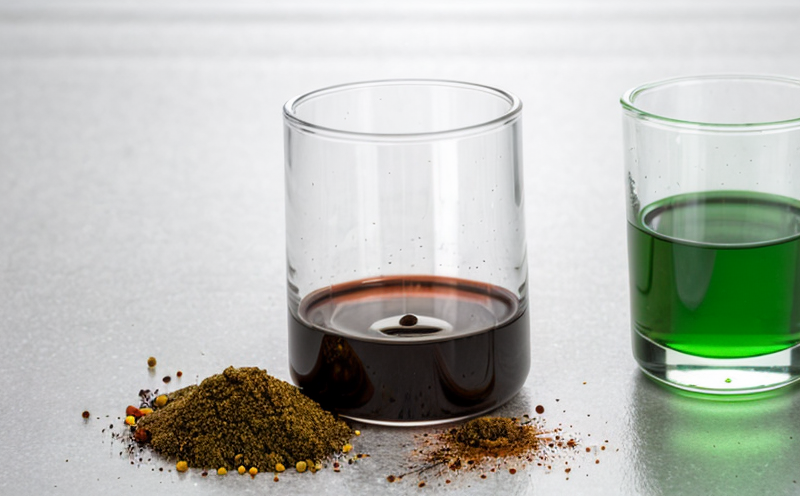ASTM E2597 Algal Biomass Production Inhibition Test
The ASTM E2597 Algal Biomass Production Inhibition Test is a critical analytical method used to determine the potential adverse effects of chemical substances on algal growth. This test is essential for environmental and toxicological studies, particularly in sectors such as wastewater treatment, pharmaceuticals, and industrial chemicals. Understanding the impact of these substances on aquatic life forms helps ensure compliance with regulatory standards and promotes sustainable practices.
The test follows standardized procedures outlined in ASTM E2597-18, which provides a framework for evaluating the toxicity of chemical compounds to algae species. This method is particularly relevant in sectors like wastewater treatment where effluents are discharged into aquatic environments. The goal is to identify chemicals that may inhibit algal growth, thereby disrupting ecological balance and potentially affecting water quality.
The test involves several key steps: preparation of the algal cultures, exposure of these cultures to varying concentrations of the test substance, measurement of changes in biomass over time using optical density (OD) readings at 680 nm. The results are then analyzed according to predefined criteria established by ASTM E2597-18.
Algal growth is monitored through regular OD measurements, which provide a quantitative measure of photosynthetic activity and overall health of the algal population. Changes in these values indicate potential toxicity from the tested substance. The test typically runs over several days, allowing for comprehensive assessment of long-term effects on algal communities.
By conducting this test, laboratories can contribute valuable data towards understanding how different chemicals interact with their surroundings. This information is crucial not only for regulatory compliance but also for developing safer products and processes that minimize environmental impact. Compliance officers will find this service particularly useful in ensuring adherence to environmental regulations set by agencies like the EPA or similar bodies.
In R&D departments, such tests play an integral role in identifying new compounds with reduced ecological footprint without compromising efficacy. For procurement teams, knowing which suppliers adhere to rigorous testing protocols can be vital when selecting raw materials for manufacturing processes.
The ASTM E2597 Algal Biomass Production Inhibition Test is a cornerstone of modern environmental chemistry and toxicology research. Its precision and reliability make it indispensable in assessing the safety profile of new compounds before they enter commercial use or are released into nature.
Scope and Methodology
This section details the scope and methodology used for conducting the ASTM E2597 Algal Biomass Production Inhibition Test. The test encompasses a series of steps designed to assess how chemical substances affect algal growth:
- Preparation of Algal Cultures: High-quality, standardized cultures are prepared following established protocols.
- Exposure to Test Substances: Algal samples are exposed to varying concentrations of the substance being tested.
- Biomass Measurement: Changes in algal biomass are monitored over time using OD readings at 680 nm.
- Data Analysis: Results are analyzed against criteria set forth by ASTM E2597-18 to determine the degree of inhibition.
The methodology ensures consistency and reproducibility across different laboratories, making it a reliable tool for both research and regulatory compliance. Compliance officers can rely on these tests to ensure that their operations meet stringent environmental standards.
Benefits
The ASTM E2597 Algal Biomass Production Inhibition Test offers numerous benefits across various sectors, including regulatory compliance, product safety, and sustainable practices:
- Regulatory Compliance: Ensures adherence to environmental regulations by providing accurate data on chemical impacts.
- Risk Assessment: Identifies potential risks associated with new chemicals before they are introduced into the market or environment.
- Sustainable Development: Helps in designing more eco-friendly products and processes that minimize harm to aquatic ecosystems.
- Product Safety: Provides insights into the safety profile of chemical compounds used in pharmaceuticals, cosmetics, and other industries.
- Data Quality: Ensures high-quality data through standardized procedures, enhancing credibility within regulatory circles.
- Research Support: Supports scientific research aimed at understanding complex interactions between chemicals and aquatic life.
- Innovation Facilitation: Encourages innovation by identifying safer alternatives to harmful substances.
The benefits of this test extend beyond mere compliance; it fosters a culture of responsibility towards the environment, contributing significantly to sustainable development efforts globally.
Why Choose This Test
Selecting the ASTM E2597 Algal Biomass Production Inhibition Test as part of your testing regimen offers several compelling reasons:
- Rigorous Standardization: Follows strict guidelines set by ASTM, ensuring accuracy and reliability.
- Comprehensive Evaluation: Provides a holistic view of how different concentrations impact algal growth.
- Consistent Results: Repeatability ensures consistent outcomes across multiple tests and laboratories.
- Expertise Assurance: Leveraging the expertise of accredited laboratories guarantees precision and integrity in results.
- Regulatory Acceptance: Widely accepted by regulatory bodies, ensuring compliance with international standards.
- Ethical Responsibility: Promotes responsible chemical use and minimizes environmental impact.
- Cost-Effective Solutions: Provides cost-effective methods to ensure product safety and regulatory compliance.
- Supportive Environment: Encourages a collaborative approach towards sustainable development initiatives.
The choice of this test signifies commitment to environmental stewardship, scientific rigor, and ethical business practices. It positions your organization at the forefront of responsible chemical management and sustainable innovation.





